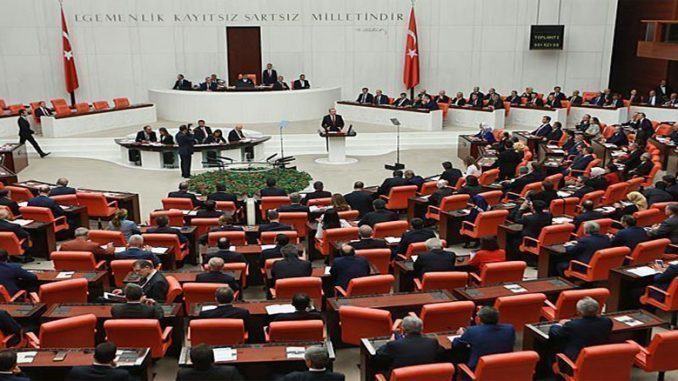
Turkey’s proposed presidential system would protect the legislature and executive’s separate spheres, said political scientist Haluk Alkan about the package of constitutional changes, which faces a referendum on April 16.
“The presidential system proposal is written with an understanding which protects the superiority of the legislative power, and aims for a powerful executive power in its own sphere,” Alkan, a professor of political science at Istanbul University, told Star daily in an interview published Monday.
Alkan said that under the new system, if the parliament wants to overcome the president’s veto, a simple majority vote is enough.
“But in order to do this in the U.S., a two-thirds majority of both houses of Congress is needed,” he explained.
Alkan said the president will only be able to issue decrees in six areas: Appointing ministers and top executives of public institutions, founding a ministry, founding a public institution, the secretariat-general of the National Security Council, the State Supervisory Council, and the Turkish Armed Forces General Staff.
According to Alkan, all of these are related to institutions and officials within the executive sphere. Alkan said the presidential system proposal also lays down the limits of presidential decrees in the legislative sphere.
“For example, no presidential decree dealing with rights and freedoms would be possible. That is to say, decrees like U.S. President Donald Trump’s limiting the freedom of travel would not be possible here,” he stressed.
Alkan also said the proposed new system takes necessary precautions against authoritarianism.
“Firstly, the president’s authority is limited to executive power. Secondly, the president can be elected a maximum of two times. A person limited to two elections can’t drag the system towards authoritarianism,” Alkan said.
– More accountability to parliament
He said that the president’s actions will also be open to checks and regulation by the Constitutional Court and Council of State.
The new system would abolish the president’s jurisdiction in the current system to act alone independently from judicial regulation, and would also strengthen the president’s accountability to parliament compared to the current system, Alkan added.
The constitutional changes have been discussed since Recep Tayyip Erdogan won his current position in August 2014 — Turkey’s first popularly elected president.
The reforms would hand wide-ranging executive powers to the president, and the post of prime minister would be abolished. The president would also be allowed to retain ties to a political party.
Other changes would see the minimum age for parliamentary candidates lowered to 18 and the number of deputies rise to 600. Under the new constitution, simultaneous parliamentary and presidential elections for a five-year term would be held in November 2019.
Turkey and the constitutional reform
The Turkish government and President Erdogan have repeatedly said that the constitutional reform would make decision making easier especially against terrorism and extremism that have killed more than 500 people since 2015. Fragile parliamentary coalition can thus be avoided, says Erdogan.
“In its actual form the parliament has become a burden for the safety of the country. This system has become obsolete and has to change,” said Erdogan in a televised speech in capital Ankara on Wednesday.
The proposed changes are also backed by the Nationalist Movement Party (MHP). Its veteran leader Devlet Bahceli was once one of the fiercest opponents of president Erdogan, who argues that the changes would bring Turkey in line with political systems such as France or the United States.
The 18 changes foreseen in the reform scrapes the role of prime minister and the president would become the head of the executive and also retain ties to a political party.
In this case president Erdogan will return at the helm of the Justice and Development Party (AKP) that he founded in 2002 and lead until he was elected as head of state in 2014 after three terms of prime minister.
The president alone would also be able to announce a state of emergency, appoint ministers and senior judges. It can also permit Erdogan to stay in power until 2029.
The main opposition centre-left Republican People’s Party (CHP) and the pro-Kurdish Peoples’ Democratic Party (HDP) decry Erdogan’s slide to authoritarianism and argue that an all-powerful head of state will harm democracy.
For CHP this controversial reform will even bring “dictatorship” in Turkey.
“These changes would downgrade Turkey from the first division of civilised states to the third one just like in the line of rogue states” said Yildrim Kaya, an influential CHP official.
He added “the amendments if adopted will abolish 140 years of parliamentary regime in Turkey.”
Ilter Turan, professor of political science at Istanbul Bilgi University, told Xinhua that its difficult to make predictions of the outcome of the vote but fears that it would shatter what is left of checks and balances in the country.
“Checks and balances would weaken even more … this kind of system doesn’t exist in European countries,” he said, as Turkey is still trying to join the European Union, a multi decade’s long and arduous ambition.
The referendum campaign has evolved into a fiercely fought battle pitting secularist against the government and its supporters.
Turan regrets that the campaign has divided Turkey even more and urged both camps to reflect on ways unifying the country.
“Supporters of changes treat the ‘No camp’ of being traitors, this is politically unhealthy,” Turan said.
Advocates of the reform say that the current system is holding back Turkey’s progress in a very difficult geostrategical sphere when the war is raging on in neighbouring Syria and iraq and in the aftermath of the failed coup last year after which more than 100,000 people have been arrested, dismissed or suspended.
Turkey is also threatened by attacks stemming from the Islamic State and Kurdish rebels.
Mehmet Akif Okur, professor of political studies at Gazi University told Xinhua that the current political system is untenable because both the president and the prime minister are elected by popular vote.
“The actual system is double-headed and in terms of governing the country is a terrible mess being really neither a viable parliamentary nor a presidential regime. The proposed reform aims to correct it in order to make governing more effective,” he said.
Experts also said that the amendments, despite the ideological rifts in the country, would also strengthen Turkey’s investment atmosphere in order to consolidate its important position in his region.
Okur said the fact that Turkish parliament is politically and ideologically very fragmented makes decision taking difficult in a country of 80 millions.
“The ideological rivalry raging on in politics reflects deeply in Turkish society. If we were to hold a referendum on which colour the public buses should be, the polarisation a cross the country will be as bad as it is with this constitutional reform,” he said.
Erdogan is adored by his many supporters who cherish a leader perceived to represent the lower-class and religiously conservative sections of society, but he is disliked by his numerous critics making him the main focus of this popular vote.
For Okur demonizing the proposed changes because of Erdogan himself and his political belief are irrelevant and uncalled for while he is convinced that in the future it would also benefit the opposition in a better functioning governance.
“They can also see one of them at the top post,” he said.



